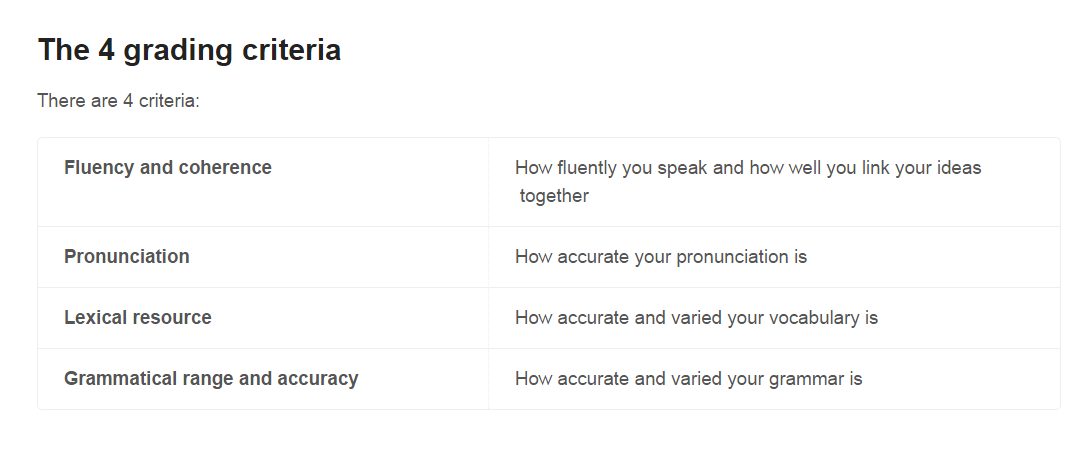ADVANCED IELTS SPEAKING (15 ชม.)
รับรองผลคะแนนเพิ่ม! 
ฝึกสร้างทักษะการพูด Academic English บน 4 หลักเกณฑ์การให้คะแนน
Pronunciation ปรับเรื่องการออกเสียงให้ถูกต้อง ใช้หลัก Sound of English (Phonetics of Cambridge)
Fluency สร้างความคล่องตัวในการพูดด้วยการสร้างเรื่องราวจากประสบการณ์จริงของผู้เรียนเป็นภาษาอังกฤษไว้ล่วงหน้า(มีโครงสร้างรูปประโยคไว้ให้แล้วและมีอาจารย์ช่วยตรวจทานให้ทั้งหมด)โดยฝึกจาก12หัวข้อหลักและ 50 คำถามย่อยที่มักใช้ถามในการสอบทั้ง 3 พาร์ทของ Speaking
Lexical Resources เพิ่ม Academic Vocab, Phrasal Verbs และ Edioms ที่เป็นที่นิยมและจำง่ายใช้ง่าย
Coherence ฝึกให้ใช้รูปประโยคและวลีต่างๆ ที่เป็นที่นิยมในสังคมภาษาอังกฤษ มีตัวอย่างให้แล้วอย่างครบถ้วน เข้าใจง่าย จำง่ายทำให้เราสื่อสารอย่างต่อเนื่องและสอดคล้องกัน ฟังดูเป็น Native English Speakers
 IELTS Speaking for 6.5
IELTS Speaking for 6.5
เป็นคอร์สสำหรับคนที่ได้คะแนนสอบ IELTS Speaking ในระดับ 6.0 แล้ว แต่มีความต้องการให้ได้คะแนนในระดับ 6.5 ขึ้นไป (เน้นฝึกให้คิดและออกแบบคำตอบจากประสบการณ์จริงของตัวเองด้วยรูปประโยคและคำศัพท์ที่จะทำให้ได้คะแนนสูงๆ โดยฝึกฝนจากเนื้อหาและหัวข้อหลักๆที่มักจะถูกถามในการสอบ IELTS Speaking )
.png) IELTS Speaking for 7.0
IELTS Speaking for 7.0
เป็นคอร์สสำหรับคนที่ได้คะแนน IELTS Speaking ในระดับ 6.5 แล้ว แต่ยังต้องการเสริมทักษะการพูดภาษาอังกฤษให้ไปถึงระดับ 7.0 ฝึกให้พูดได้ครอบคลุมเนื้อหาและคล่องตัวต่อเนื่องมากขึ้น(เพิ่ม Fluency Vocabulary and Coherence) ฝึกให้สามารถพูดได้ครอบคลุมเนื้อหามากขึ้นเป็น 3 เท่า จากระดับที่ฝึกฝนในคอร์ส IELTS Speaking for 6.5

What do these criteria mean?
This is IELTS and IELTS examiners are trained to interpret these criteria in a particular way. In theory it should not matter where you take your test as all examiners grade consistently. I suggest you should spend time understanding the detail here as that way you can avoid many common mistakes.
One main point is that in all the criteria a key idea is being clear. The main idea is whether you can express yourself clearly so that someone else can understand you.
Fluency and coherence
Fluency is a combination:
speed of speech
length of answer
pausing correctly
Coherence is the ability to:
expand your answers
answer the questions directly
add relevant detail to explain or illustrate your answers
connect your sentences by using tenses and connectors
Common mistakes
You should note that very fast or very long answers are not necessarily good, as you may be penalised for poor pronunciation or lack of coherence. In the speaking the main point is that you are able to express yourself clearly.
Another common mistake is to not answer the question. This is where you will be penalised.
Pronunciation
The main point here is that your pronunciation is easy to understand and whether your are able to make your meaning clear. Features of good pronunciation include:
basic word pronunciation
linked speech sounds
correct sentence stress
correct use of intonation (rising and falling)
You should note that there is no need to have a “British” or “American” accent.
Lexical Resource (Vocabulary)
Once again the key concept here is clarity: do you have enough words to express yourself clearly? This is judged by your ability to:
have enough vocabulary to discuss a range of topics
to use vocabulary accurately
be able to explain yourself when you do not have the right word
Common Mistake
A common mistake here is to use long words without really knowing what they mean.
Grammatical Range and Accuracy
There are two key key points to understand here:
you need to avoid grammar mistakes especially with your tenses
you need to use a range of grammatical structures and you should not just use simple sentences all the time
When are they graded?
All 4 criteria are judged throughout all 3 parts of the speaking test – so it is important to concentrate from beginning to end. Although your test will be recorded, you will almost certainly be graded in real time in the test by the examiner sitting in front of you.
How are band scores calculated?
All the criteria count equally
One mistake candidates make is to focus on one or other of the criteria or forget about one altogether (normally cohesion and coherence). Why is this wrong? They all count equally.
What happens is that you get a score out of 9 for each of the criteria, they are added together and then that score is divided by 4.
An example: So let’s take an example. Here is someone who has forgotten to think about coherence and hasn’t fully answered the question. S/he has good general English so does well in grammar and vocabulary, but sadly that is not enough.
grammar 7
vocabulary 7
pronunciation 6
coherence 4
7+7+6+4 = 24 and 24 divided by 4 equals 6. The message is grammar and vocabulary are not enough – you need to focus on all the criteria throughout the exam.
It is good advice to look at the public version of the grading criteria for yourself. You’ll find them here:
IELTS speaking criteria

